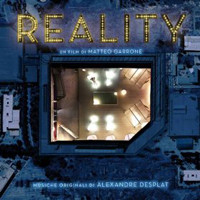- Composed by Alexandre Desplat
- Radiofandango / 2012 / 38:29
A black comedy about a man who dreams of being a reality tv contestant, the French/Italian co-production Reality (directed by Matteo Garrone) has attracted rave reviews at a lot of 2012’s film festivals, including a Grand Prix win at Cannes, though it’s yet to see a wide release in English-speaking territories. The film’s score is by the ever-busy Alexandre Desplat (this is one of eight Desplat-scored films to be released during 2012). It’s a refreshing change of pace for the composer, who adopts a lighthearted approach throughout, starting with the Danny Elfman-style silly chorus in the opening cue. The theme introduced there goes on to dominate the short score, appearing in numerous guises (usually sans chorus).
There are more serious moments too – “Come Un Palcoscenico” keeps the same small ensemble (keyboards, a few strings) but there’s a tragic air running through it, and more than a hint of desperation. “Fuga” is a wonderful little track, slowly building momentum to its fully orchestral conclusion from the modest, comedic pizzicato string opening. While I opened by saying that this is a score markedly different from Desplat’s other recent efforts – and that there is a definite Elfman influence – it is still absolutely recognisable as being in his voice, which is one of film music’s most distinctive. It’s certainly not a major entry in his rapidly increasing and highly impressive canon of work, but it’s a very enjoyable one all the same. There are only about 25 minutes of score on the album, and they whiz by at a canter – most fans of the composer should find this to be a very satisfying, if very slight, addition to their collections. *** 1/2
facebook.com/moviewave | amazon.com












That’s always the true mark of when a composer has arrived, isn’t it, when you can identify their influence in another composer’s work? Elfman has definitely done so, but I wonder how long it’ll be before we talk about a “definite Desplat influence” on a score?
@orion_mk3, actually, I have been noticing hints of “Desplat influence” in certain scores over the past few years. Thomas Newman’s The Iron Lady certainly had some Desplat-like moments; Korzeniowski’s W.E. struck me as a more overtly emotional take on a similar classically-inclined method of writing; even some of the more suspenseful, low-key underscore from Doyle’s Rise of the Planet of the Apes uses a similar sense of precise rhythmic woodwind-led movement.
Desplat’s style isn’t memorable for any sort of specific harmonic language, but rather for his ultra-precise instrumentation, and I think that is what other composers have been picking up on.
@Edmund Meinerts: JNH’s Water For Elephants was very Desplat-esque. Though this score has more in common with Bruno Coulais’s scores for Coraline and The Secret Of Kells. Though it’s not the first Desplat score with Elfman influences. Broomsticks And Fire from Deathly Hallows 2 had a very Elfman-esque action writing with the brass, string rhytms and choir.